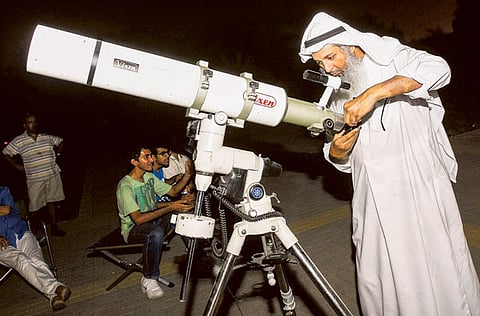UAE national observatory to be constructed soon
UAE national observatory will be key astronomy facility in Arabian peninsula

Sharjah: Sky gazing in the UAE to watch for meteor showers or study celestial bodies will “soon” be done high up in the mountains at the proposed UAE national observatory that will be well underway in the next 12 months, astronomers told Gulf News.
“The UAE National Astronomical Observatory and Telescope project has been approved and that has been done. We are now at the phase of putting the specification for the bidding process,” Hassan Al Hariri, CEO of the Dubai Astronomy Group, told Gulf News on the sidelines of the special viewing of the Perseid meteor shower at Zubair Camp in Sharjah on Monday night.
Al Hariri said the project is ready to be handed over to the astronomy group as the first phase contractors, which is also tasked to do a feasibility study on the technical requirements of the project. He said three sites high up in the mountains above 1,500 metres are being considered.
One of them is the Jais Mountain in Ras Al Khaimah which stands at 1930 metres above sea level. Snowfall is occasionally reported in the area during winter.
“It’s [national observatory] under final approval by the federal government in Abu Dhabi where the funds will then be approved. In the next 12 months we’ll be well underway. The construction is probably not gonna start until the end of 2014,” Keith Cobby, also from Dubai Astronomy Group, told Gulf News.
Cobby said with the establishment of the national observatory, the UAE will be able to significantly and additionally contribute to the international astronomy community.
“The UAE national observatory will be the figure head astronomy facility in the Arabian peninsula. We are hoping that we can nurture collaboration and advice on other observing structures, be it Saudi Arabia, Southern Iraq, or Jordan,” Cobby said.
Cobby added that the UAE has a distinct advantage in terms of studying celestial bodies.
“We are at latitude where we have a climate which gives us good access to dark skies more so than northern latitudes which have much more clouds and temperate climates. So we have more available observing days. So we’re filling a gap that is currently missing,” Cobby said.
Following the completion of the national observatory, other projects that will help bring back astronomy into the current curriculum are being planned. A Space and Astronomy Academy that will offer courses in astronomy and a Science Centre are expected to be constructed after the national observatory is completed. Al Hariri said they are looking at a three to five-year build plan.
“The new stage for space development is us — individuals. Each of us can contribute and create our own miracles. Astronomy is a global saga we can all contribute to,” Al Hariri said.


